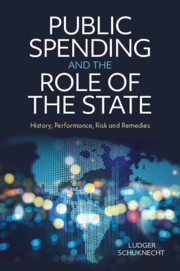Book contents
- Public Spending and the Role of the State
- Public Spending and the Role of the State
- Copyright page
- Dedication
- Contents
- Figures
- Tables
- Preface
- Acknowledgements
- Acronyms and Abbreviations
- Introduction
- Part I The Growth of Government
- Part II Value for Money
- Part III Fiscal Risks
- Part IV Remedies
- 10 Rules and Institutions
- 11 Conclusions and Epilogue
- Table of Data Sources
- Bibliography
- Index
11 - Conclusions and Epilogue
from Part IV - Remedies
Published online by Cambridge University Press: 30 October 2020
- Public Spending and the Role of the State
- Public Spending and the Role of the State
- Copyright page
- Dedication
- Contents
- Figures
- Tables
- Preface
- Acknowledgements
- Acronyms and Abbreviations
- Introduction
- Part I The Growth of Government
- Part II Value for Money
- Part III Fiscal Risks
- Part IV Remedies
- 10 Rules and Institutions
- 11 Conclusions and Epilogue
- Table of Data Sources
- Bibliography
- Index
Summary
This chapter concludes by considering the four main themes of the book: 1) How public spending has evolved over time, initially focussing on sound rules of the game and essential public goods and services before shifting more and more to welfare spending while debt grew to record levels.2) The huge differences in government performance and efficiency, the reinvigorating role of expenditure reforms and the pragmatic ‘optimal’ size of government, that does not require public spending of more than 30–35%, perhaps 40% of GDP.3) The main fiscal risks in the social and financial sphere from an ever-growing ‘insurance role’ of the state, which has contributed to rising debt and could put stability and sustainability at risk. 4) The case for strong rules and institutions to contain public spending, debt and fiscal–financial vulnerabilities. If governments focus on their core tasks and do them well, they underpin a well-functioning market economy with prosperity, freedom, opportunity and trust. This is the message of the social market economy model and it holds for the challenges related to the Coronavirus crisis which had broken out when this book went into publication. Not heeding this message in the past has contributed to governments being over-burdened and over-indebted today. We will all benefit from a lean, efficient and sustainable state.
Keywords
Information
- Type
- Chapter
- Information
- Public Spending and the Role of the StateHistory, Performance, Risk and Remedies, pp. 257 - 264Publisher: Cambridge University PressPrint publication year: 2020
